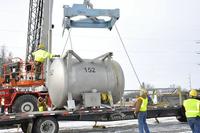-
U.S. helps Ukraine detect dirty bombs at Euro 2012 tournament
In advance of the Euro 2012 soccer tournament in Ukraine, security officials are stocking up on radiation detectors due to growing concerns of a dirty bomb attack during the event
-
-
Universal Detection developing smartphone radiation scanner for food
In the wake of Japan’s nuclear disaster at the Fukushima Daiichi atomic energy plant, concerns over contaminated food supplies have swept the nation, sparking Universal Detection Technology to develop a smartphone radiation detector specifically designed for comestibles
-
-
Nuclear accident reawakens California’s anti-nuke movement
Following the discovery of a small leak at a nuclear power plant near San Diego, California in January, the state’s anti-nuclear movement has hit a fever pitch
-
-
Fukushima accident caused only low levels of fallout in U.S.
Fallout from the 2011 Fukushima Dai-ichi nuclear power facility in Japan was measured in minimal amounts in precipitation in the United States in about 20 percent of 167 sites
-
-
End of Utah’s chemical weapons stockpile signals end of federal grants

As the last of Utah’s chemical weapons stockpile is destroyed, the millions of dollars that have flowed into the state from federal grants will begin to disappear along with thousands of jobs
-
-
Growing ubiquity of X-ray scanners could pose public health risk
Body scanners are now routinely deployed in airports, border check points, and even the streets of some American cities; with the use of X-ray scanners by law enforcement agencies becoming increasingly commonplace, health advocates worry that the additional radiation exposure could pose a health risk; repeated exposures to low-doses of radiation can lead to cancer; currently federal health standards are primarily limited to medical X-rays and since the body scanners do not fall under this category, the decision on where and how to use the devices is entirely up to security officials
-
-
Advanced forensic tool for the battlefield
A forensic tool could soon make the analysis of evidence faster and more accurate, giving military investigators an advantage in the wars against drugs and terror
-
-
Nuclear accidents pose “essentially zero risk" to public health
A new study by the U.S. Nuclear Regulatory Commission (NRC) concluded that there is only a “very small” risk to public health if a severe nuclear accident were to occur in the United States
-
-
New technology will allow miniaturization of chemical sensors
A new measuring technology – based on measuring near-resonant nonlinear behaviors rather than measuring chemomechanically induced shifts in linear natural frequency – will allow a dramatic miniaturization of sensors; the miniaturization will make these sensors more suitable for first response, law enforcement, and military missions
-
-
Scientists develop new concrete corrosion sensors
Scientists have made a major breakthrough in developing sensors which dramatically improve the ability to spot early warning signs of corrosion in concrete; the sensors will make monitoring the safety of structures such as bridges and vital coastal defenses much more effective
-
-
Inspectors uncover Qaddafi’s hidden WMD stockpile
Last week international weapons inspector found clear evidence that the late Libyan dictator Moammar Qaddafi had large caches of hidden chemical weapons, despite making a promise to destroy all weapons of mass destruction weapons in 2004
-
-
Reveal Imaging’s liquid explosive detector passes European test
Airline passengers could soon be allowed to carry liquids on board thanks to a new explosive detector by Reveal Imaging
-
-
Smiths Detection unveils new portable chemical detector
Earlier this month Smiths Detection unveiled its latest chemical detector, a portable device that combines high speed, high-resolution gas chromatography and a miniaturized toroidal ion trap mass spectrometer
-
-
55 dog teams to sniff out explosives at Olympics
At the upcoming London Olympic Games, more than 150 bomb-sniffing dogs will be on hand to detect any potential threats
-
-
NYPD developing concealed gun detecting tech
The New York Police Department (NYPD) is currently at work on a device that can detect if a person is carrying a concealed firearm from as far as eighty-two feet away
-
More headlines
The long view
Keeping the Lights on with Nuclear Waste: Radiochemistry Transforms Nuclear Waste into Strategic Materials
How UNLV radiochemistry is pioneering the future of energy in the Southwest by salvaging strategic materials from nuclear dumps –and making it safe.
Model Predicts Long-Term Effects of Nuclear Waste on Underground Disposal Systems
The simulations matched results from an underground lab experiment in Switzerland, suggesting modeling could be used to validate the safety of nuclear disposal sites.
